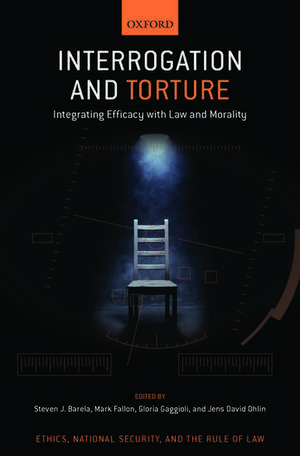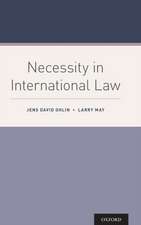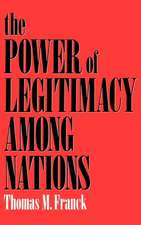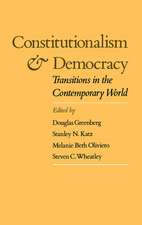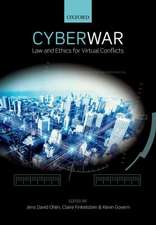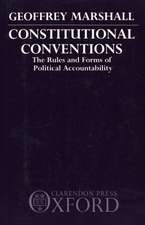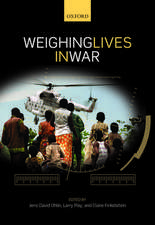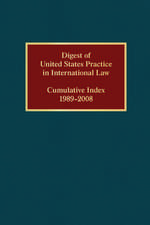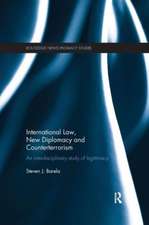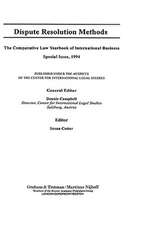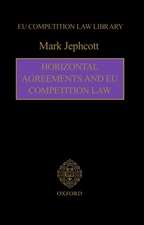Interrogation and Torture: Integrating Efficacy with Law and Morality: Ethics, National Security, and Rule Law
Editat de Steven J. Barela, Mark Fallon, Gloria Gaggioli, Jens David Ohlinen Limba Engleză Hardback – 26 feb 2020
Preț: 694.67 lei
Preț vechi: 787.28 lei
-12% Nou
Puncte Express: 1042
Preț estimativ în valută:
132.96€ • 137.02$ • 112.25£
132.96€ • 137.02$ • 112.25£
Carte tipărită la comandă
Livrare economică 18-24 februarie
Preluare comenzi: 021 569.72.76
Specificații
ISBN-13: 9780190097523
ISBN-10: 0190097523
Pagini: 624
Dimensiuni: 218 x 142 x 46 mm
Greutate: 1 kg
Editura: Oxford University Press
Colecția OUP USA
Seria Ethics, National Security, and Rule Law
Locul publicării:New York, United States
ISBN-10: 0190097523
Pagini: 624
Dimensiuni: 218 x 142 x 46 mm
Greutate: 1 kg
Editura: Oxford University Press
Colecția OUP USA
Seria Ethics, National Security, and Rule Law
Locul publicării:New York, United States
Recenzii
As a guide to the most up-to-date thinking on the science and ethics of interrogation, this book is a highly valuable contribution. Given its wide disciplinary range and substantive breadth, it holds novel and illuminating insights for even the most well-read torture researcher.
Interrogation and Torture is an important step in the right direction.
Interrogation and Torture is a crucial and compelling contribution to the global fight against torture, arriving at a time when the acceptance of torture-incredibly-seems to be on the rise in some important quarters. Among the remarkable contingent of 36 contributors from 14 different countries, you will notably find the current, and two former, UN Special Rapporteurs on Torture. And perhaps most significantly, I believe this invaluable book can help build a historic bridge between the human rights and law enforcement communities. Sometimes assumed to be adversarial, this book proves that their logics are remarkably similar when it comes to effective interrogation.
Criminal investigators are the purveyors of truth-the core objective of any interview or interrogation. The talented team of contributions in this book provide unprecedented clarity on this matter to those seeking to protect national security and the public safety. In doing so they offer sound guidance to improve the practice of obtaining accurate and reliable information, ensuring that those who employ the methods adhere to a code of ethics, integrity, and the law.
The chapters found in this genuine page-turner offer valuable programs of action: the science presented by researchers and practitioners plainly guides us toward rapport-based interrogation because of its efficacy; international law experts call for a standard-setting instrument for non-coercive interviews; military professionals warn of grave strategic consequences for torture policy; and psychologists propose a Truth Commission to rescue their profession. Citizen readers of this book will become informed of significant developments on interrogation crucial to public policy, and the ultimate implementation of these insights will depend on self-aware and inquiring patriots.
Of special interest here to practitioners are the chapters on the science behind what really produces reliable information — and why torture extracts only lies and faulty memories. If knowledge is a light, it is one this book lifts high, showing us the way home over dark and troubled waters.
We have been in space, we can make the blind see, and we save our photos in clouds, but we don't stop torture. We know torture is illegal and immoral, and now the emergent science shows it to be ineffective. Interrogation and Torture takes you through a dim and scary landscape, but the guides — the contributors to the volume — navigate well. The darker it is, the clearer they see. I strongly recommend this book — it's out of the ordinary; it's about life and death.
Interrogation and Torture is an important step in the right direction.
Interrogation and Torture is a crucial and compelling contribution to the global fight against torture, arriving at a time when the acceptance of torture-incredibly-seems to be on the rise in some important quarters. Among the remarkable contingent of 36 contributors from 14 different countries, you will notably find the current, and two former, UN Special Rapporteurs on Torture. And perhaps most significantly, I believe this invaluable book can help build a historic bridge between the human rights and law enforcement communities. Sometimes assumed to be adversarial, this book proves that their logics are remarkably similar when it comes to effective interrogation.
Criminal investigators are the purveyors of truth-the core objective of any interview or interrogation. The talented team of contributions in this book provide unprecedented clarity on this matter to those seeking to protect national security and the public safety. In doing so they offer sound guidance to improve the practice of obtaining accurate and reliable information, ensuring that those who employ the methods adhere to a code of ethics, integrity, and the law.
The chapters found in this genuine page-turner offer valuable programs of action: the science presented by researchers and practitioners plainly guides us toward rapport-based interrogation because of its efficacy; international law experts call for a standard-setting instrument for non-coercive interviews; military professionals warn of grave strategic consequences for torture policy; and psychologists propose a Truth Commission to rescue their profession. Citizen readers of this book will become informed of significant developments on interrogation crucial to public policy, and the ultimate implementation of these insights will depend on self-aware and inquiring patriots.
Of special interest here to practitioners are the chapters on the science behind what really produces reliable information — and why torture extracts only lies and faulty memories. If knowledge is a light, it is one this book lifts high, showing us the way home over dark and troubled waters.
We have been in space, we can make the blind see, and we save our photos in clouds, but we don't stop torture. We know torture is illegal and immoral, and now the emergent science shows it to be ineffective. Interrogation and Torture takes you through a dim and scary landscape, but the guides — the contributors to the volume — navigate well. The darker it is, the clearer they see. I strongly recommend this book — it's out of the ordinary; it's about life and death.
Notă biografică
Steven J. Barela is a Research and Teaching Fellow at the University of Geneva in the Global Studies Institute and a member of the Law Faculty. He specializes in interdisciplinary scholarship with a monograph on counterterrorism and an edited book on armed drones.Mark Fallon is a national security expert, international security consultant, and counterterrorism specialist. His government service spans more than three decades with positions including NCIS Deputy Assistant Director for Counterterrorism and Senior Executive within the Department of Homeland Security.Gloria Gaggioli is Swiss National Science Foundation Professor at the University of Geneva. She specializes in public international law, and more specifically, international humanitarian law and human rights law.Jens David Ohlin is Vice Dean and Professor of Law at Cornell Law School. He specializes in international law and all aspects of criminal law, including domestic, comparative, and international criminal law.
